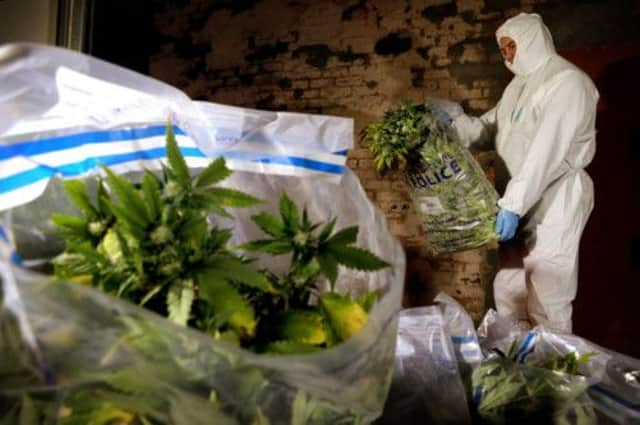Scottish trafficking laws may criminalise victims


Graham O’Neill, who managed the Baroness Helena Kennedy inquiry into the crime, has urged the Crown Office or Scottish Criminal Cases Review Commission (SCCRC) to investigate.
Writing in The Scotsman, he warns that, otherwise, Scotland may find it is not compliant with the European Convention on Human Rights.
Advertisement
Hide AdAdvertisement
Hide AdThe warning follows criticisms of Scottish justice by the Anti-Trafficking Monitoring Group in its ‘In the Dock’ report.
His comments echo concerns already raised that young people brought to this country by force and made to commit crimes have been criminalised by the state.
The report covered the whole of the UK, but referring to Scotland specifically it said: “Most serious was information of potential victims of trafficking – including children – being penalised and held on remand, with some also being convicted of crimes that may have been committed under duress and as a consequence of their trafficking.
“This seems, in particular, to be a problem for Chinese or Vietnamese persons being exploited by organised criminals with, in at least some instances, their being debt-bonded and transported to different parts of Scotland, to farm cannabis in residential or disused industrial locations, while being controlled through a lack of pay, social isolation, and living in primitive and often unsafe conditions.”
Similar concerns had previously been raised by Mr O’Neill and Jenny Marra, Labour MSP and member of the Scottish Parliament justice committee.
Their interventions led to a change of policy by Police Scotland, with Assistant Chief Constable Malcolm Graham promising the force would adopt a “victim-focused approach” to tackling human trafficking.
However, there are concerns that some victims had been criminalised before this change came into effect.
“Recent specialist reports convey the necessity for every criminal justice system to better understand whether trafficking survivors may have been subject to criminal justice processes for offences that, in fact, may have been inextricably linked to survivors’ trafficked predicament,” Mr O’Neill said.
Advertisement
Hide AdAdvertisement
Hide Ad“So, now seems an appropriate time for a proportionate review to be undertaken in Scotland of cases that fit patterns of potential human trafficking into forced criminality.”
The SCCRC said it would carry out a review if cases were referred to it. A spokesman said: “I confirm the Commission’s willingness to consider any cases submitted to us and identified as falling within this category.”
However, the Crown Office and Procurator Fiscal Service (COPFS) said it was not aware of any cases wrongly prosecuted.
“At the time of the Follow On Report on the Inquiry into Human Trafficking in Scotland, COPFS indicated that we were not aware of cases where a wrong decision has been taken,” a spokesman said.
“COPFS guidance is clear that there is a presumption against the prosecution of a credible victim of human trafficking for crimes that arise as a consequence of their being trafficked.”
Analysis by Graham O’Neill: Is justice penalising the slaves, not the slavery?
ARE trafficking victims suffering miscarriages of justice in Scotland?
Last week, in the Old Bailey, seven men were sentenced for a total of 95 years. They groomed and subjected at least six young girls to horrendous sexual, psychological, and physical abuse, committing child sexual exploitation, rape, and sex slavery. As Judge Peter Rook said, they had robbed the girls of their adolescence.
Advertisement
Hide AdAdvertisement
Hide AdWhilst the severity of the sentences is welcome, what about when justice goes into reverse, when survivors of modern slavery are criminalised for offences that were a manifestation or a direct result of their trafficked predicament? Surely, this doesn’t happen in Scotland?
There is mounting evidence that, regardless of whether corroboration stays or goes, we may unconsciously be criminalising slaves and not slavery.
Jenny Marra MSP raised this possibility in the Scottish Parliament in February, as did I through The Scotsman, and, since then, three national reports have expanded the concern, which is that we may well have young people in our young offender institutions, prisons, or detention centres today – many of whom of Vietnamese heritage on drugs convictions – who may not deserve to be there.
For a decade it has been European, not Scots or UK, legislation that has fundamentally driven progress in anti-trafficking, this is as true now than ever, with – in particular – the Article 4 ECHR decision in Rantsev v Cyprus and Russia [2010], combining with Article 8 EU Human Trafficking Directive to lever the strongest presumption yet that criminal justice institutions do not prosecute or penalise survivors for offences arising from their lived exploitation. This has already been felt in English courts and it may be but a matter of time before an appeal is laid in a Scottish court by a trafficking victim.
So, to ensure compliance with the EU and ECHR, I strongly recommend that either the Crown Office and Procurator Fiscal Service or the Scottish Criminal Cases Review Commission should now consider initiating a review of all convictions and sentences involving those groups known to be vulnerable to human trafficking in Scotland for offences that are known internationally to be associated with forced criminality.
• Graham O’Neill is a writer on modern slavery and human trafficking.